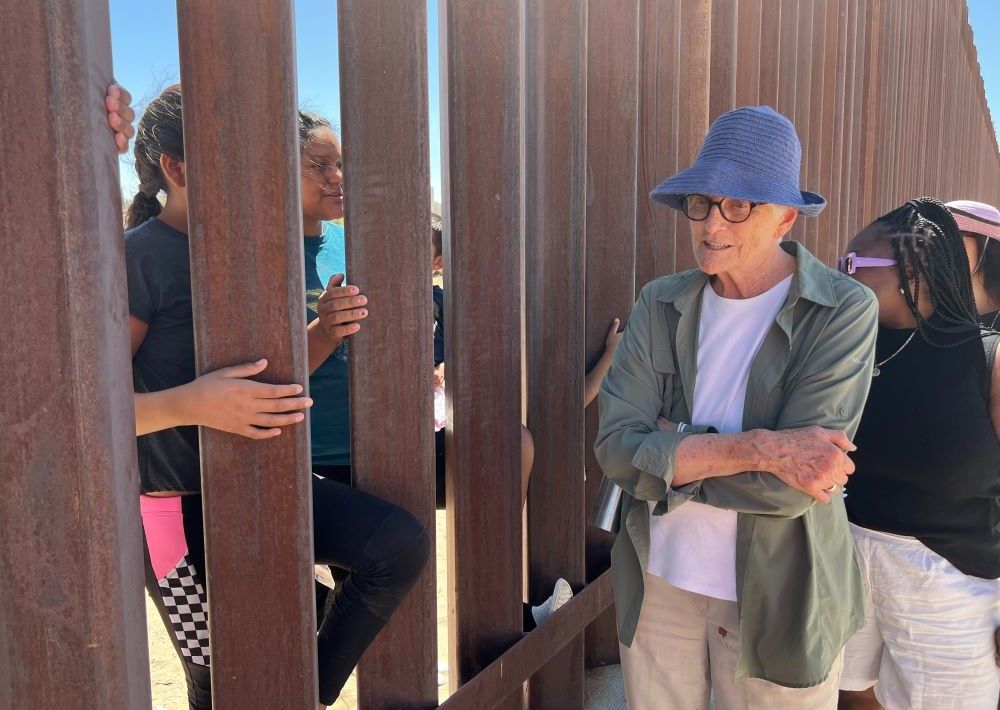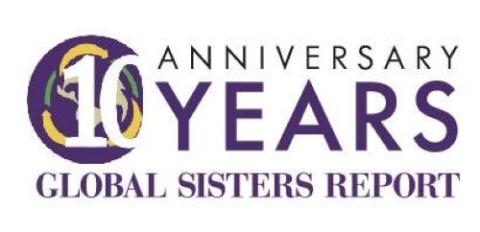
Mercy Sr. Kathleen Erickson is seen at the wall on the U.S. southern border in 2022. (Courtesy of Sisters of Mercy)
Editor's note: Global Sisters Report, the dynamic online community that reports on and gives voice to Catholic women religious around the world, is celebrating its 10th anniversary this year. Join us as we take another look at stories and columns published in 2014 with new updates and reporting.

In 2014, things at the U.S. southern border seemed as bad as they could get.
U.S. border patrol made 486,651 arrests that year, nearly all of them on the southern border. More than 68,000 of those arrested were unaccompanied minors.
And on July 31, 2014, Global Sisters Report, which had just started three months before, published a Q&A with Mercy Sr. Kathleen Erickson, who had been working on immigration and social justice issues for more than two decades. Much of her focus in the interview was on the root causes of the immigration crisis and how most Americans enjoy comforts such as cheap consumer goods at the expense of people being exploited elsewhere.
Flash forward 10 years, and everything is different while nothing has really changed.
Immigration at the southern border is still a crisis — only more so. The crush of unaccompanied minors continues, but is getting much less attention despite the number of unaccompanied minors border patrol arrested nearly doubling to 126,655 in 2022 — because the total number of arrests has nearly quadrupled to 1.6 million, according to the Transactional Records Access Clearinghouse, or TRAC, on immigration at Syracuse University.
The vast majority of people at the border seeking asylum are still from Latin America, but the nations most are coming from has changed. Those arrested having citizenship in Cuba, Venezuela, Nicaragua and Columbia make up 32% of the total, while in 2014, those citizens made up less than 1% of those arrested, according to TRAC.
And Erickson is still in Omaha, Nebraska, working on social justice issues and still travels to the border whenever possible. But now much of her focus is the paradox of a nation that needs 3 million more workers to fill open positions, but will not allow the 3 million people waiting for an immigration hearing to work. The average wait for a hearing is now more than two years.
Global Sisters Report: So looking back to 2014, what has changed since then and what hasn't changed?
Erickson: I think people now realize how serious the situation is. And that as we go on with our lives that there is extreme suffering happening elsewhere, right in our own country.
Looking back at what I said 10 years ago, at that time people were just beginning to realize, and I would say that realization is 10 times now what it was then. People are finding people on the street who don't know where to go, who have no money, who have nothing, and the response is generosity. That's a change.
It's also a challenge to us. You have to decide who you are and whether you can ignore it or whether you have to do something about it. Especially religious communities.
Even when times are hard, we still live very comfortable lives — certainly by comparison.
Advertisement
Your focus in 2014 seemed to be on the underlying causes of this tidal wave of migration. Have those underlying causes changed? Have we finally started to address them?
I think they've gotten worse. And they've spread to different countries which makes things here more difficult. Ten years ago, it was people who were being affected by U.S. policies in Central America — there were wars going on, so much conflict.
But people had been fleeing for years, so people arriving here, they had family that had already come. They had contacts here, they had people who could help them.
Now, we're getting people from Venezuela, Columbia, Haiti, and they don’t necessarily have contacts in this country. So they need assistance, they need housing, they need everything.
And now there are things like sanctions — because we don't like what’s happening in Venezuela, for example, we forbid trade with them, and that snowballs into inequality and poverty that forces people to leave.
Have the misperceptions and misinformation about immigration changed?
No. People say immigrants are coming here to take our jobs, but we are short of workers. The biggest problem is they are not allowed work permits. I've been to forums where people from various industries are admitting we are short thousands of workers in this area, thousands of workers in that area. So much so that some are sheepishly saying people will hire them even without work permits, which, of course, can lead to abuse.
I'm trying to change the narrative about who these people are that are coming. I'll give a presentation and people are just kind of dumbfounded that we need workers and have immigrants that can't work. It's not that they're taking our jobs — we need them to fill these jobs.
One of the things we're discovering as we're trying to help immigrants coming through this area is they need counseling for depression. They want to work, they can work, they're willing and able, but they can't get hired because they can't get a work permit. They're depressed, they need to work. They want to feed their families, they want to take care of themselves, and they're not allowed.
Ten years later, are you still hopeful?
Oh yes. People are coming out of the woodwork to help. So many people are making contributions, they're coming to help them find places to live, to get their children into school. It's the goodness of people that gives me hope.






